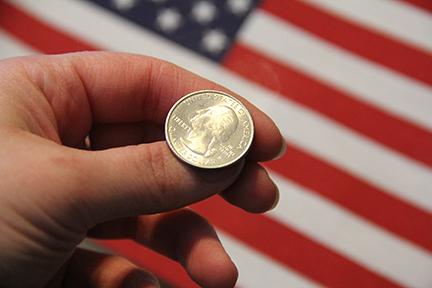Coin Flips and Superdelegates
The Democratic Primaries

The Iowa caucuses were so close a coin toss was used to determine the winner of the Democratic delegates./Photo illustration by Mary Kroeck
February 16, 2016
A coin flip is usually decides something simple, like choosing between eating chocolate or vanilla ice cream, wearing a red shirt or a blue shirt. Apparently it can also be used to see who gets the party nomination for the most important job in the United States.
On Feb. 2, the Iowa caucuses led to a tie between Democratic candidates Hillary Clinton and Bernie Sanders. At the time of the vote counts, a total of 60 voters were reported to have been missing from the event after contributing to the caucus in different neighborhoods, which led to an improper tally of those present.
The decision to appoint delegates to Sanders or Clinton all came down to the flip of a coin–six flips of a coin to be exact.
The first thing that came to mind upon hearing of the event was, “What is this, kindergarten? Why the heck are we placing the fate of political standing on a random outcome?”
Well, as it turns out, the coin flip in primary voting is used in the event of a tie between the amount of votes of each candidate. Rarely does it happen, but when it does, the decision must be made then and there.
The Iowa caucus guide states, “In a case where two or more preference groups are tied for the loss of a delegate, a coin shall be tossed to determine who loses a delegate.”
Though, it’s not as messed up as having delegates and superdelegates in your primaries, which is the case for the other delegate allocation case in New Hampshire, where Clinton won more delegates than Sanders. A superdelegate is a delegate who is picked to vote for any candidate they see fit, regardless of voter preference.
Part of me questions what is so super about them. Do they have mystical powers of clairvoyance where they can tell who will be a respectable head of state for the next four years? No, they are just current or former party leaders or elected officials.
Then should the allocation of delegates be determined through a coin flip and handpicked superdelegates?
Personally, as much as it seemed absurd at first, I personally can’t see any other way of fixing the situation of a tied outcome. The caucus could do a recount and extend the process for a day, but some voters may not be willing to return for a second vote. If a decision is to be made, it should be done right away.
However, in a way, I feel there should be a more civil way to determine how many delegates each candidate gets. Using a coin is just as practical as using the spinner from the Game of Life– giving Clinton odd numbers and Sanders even ones. They could have used any way to figure out who wins the caucus, and it would be just as bewildering, relying on the powers of probability to make a decision.
As a matter of fact, if the amount of votes were so close as to warrant a recount or a final decision, why not have both candidates have the same amount of delegates? If both candidates are desired by the people, why not make them running mates that can settle their differences to solve the matters of the people? They could be like Luke Skywalker and Hans Solo, joining forces and bringing peace, positivity and civility to a country torn by corruption, greed and malevolence. That would be one heck of a change.
In this country, though, you have to choose chocolate or vanilla ice cream, because strawberry or pistachio are not on the menu. There’s only one person getting that position and if you don’t like it, you can move somewhere else. In a perfect world, we would have the right people with the right intentions doing the right thing for the people they govern and serve. A coin toss wouldn’t matter. We’d be as passionate about voting seeing the latest blockbuster. Until then, may the force be with us–at the polls and in coin tosses.







